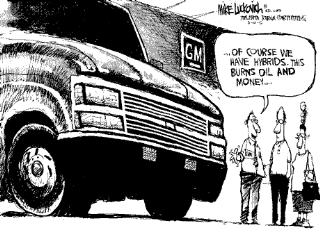Sunday, August 27, 2006
Hybrids Could Pay For Themselves - If Bush Lets Them

Edmunds and CNN performed a study, and determined that the difference in price between standard cars and their hybrid counterparts, typically $1,200 to $7,000, could be made up within 6 years of purchasing the hybrid by savings in gas purchases and government incentives already in place. This is dependant on gas being above $3 a gallon, and incentives remaining in place.
 Presently, the Bush administration plans on reducing incentives in April 2007 and eliminating it in October 2007, with no apparent reason for the reduction in incentives. Instead, the government should be looking to enhance these credits, reducing the United States’ dependence on foreign oil. This would both affect the balance of power between the West and the Middle East and lower the price of gas throughout the country.
Presently, the Bush administration plans on reducing incentives in April 2007 and eliminating it in October 2007, with no apparent reason for the reduction in incentives. Instead, the government should be looking to enhance these credits, reducing the United States’ dependence on foreign oil. This would both affect the balance of power between the West and the Middle East and lower the price of gas throughout the country.
Nearly three months ago, I made a proposal that makes even more fiscal sense today; I suggested taking one of Bush’s proposals to really better society. Bush had proposed to take a percentage of the profits realized by oil companies in the last quarter and use these profits to encourage the purchase of hybrids, by giving $1,000 to any consumer who purchases a hybrid, $1,000 to showrooms when they sell a hybrid, and $1,000 to financing companies to provide 0% financing on hybrids.
Add that into the recent study, and the hybrids can be even more cost effective. This could lead to more sales even quicker than forecasted; right now Toyota, the leading producer of hybrids, predicts selling 1 million units by 2010. And this could mean a radical reduction in the amount of oil consumed by the US. This would be extremely beneficial for all citizens in the United States, and for our Western Allies.
 While prices would reduce on gas, the purchasing power of your average citizen would also increase greatly. As the demand of the largest consumer of oil would reduce, the cost for a barrel of crude would reduce world wide as well, and available supplies would be increased. And countries like Russia, England, Mexico, and the US would be able to produce a much larger percentage of the oil needed world wide, weakening the present threat from the Middle East.
While prices would reduce on gas, the purchasing power of your average citizen would also increase greatly. As the demand of the largest consumer of oil would reduce, the cost for a barrel of crude would reduce world wide as well, and available supplies would be increased. And countries like Russia, England, Mexico, and the US would be able to produce a much larger percentage of the oil needed world wide, weakening the present threat from the Middle East.
So if we would see so many societal benefits from such a maneuver, why aren’t we doing it? I theorize it’s a matter of money, that such an obvious maneuver to really improve our world situation is not being enacted only because George W. Bush makes too much money with the present situation, where oil is in short supply. But only he knows the real answer; let’s hope that one day he moves past that answer, and begins working to improve our society.
technorati tags: Oil, Gas, Gasoline, Price, Hybrid, George W. Bush, Bush Administration, Middle East, West, Tax, Incentive
Cartoons from Brian's World.
Posted by Scottage at 10:47 PM /
| |




 Presently, the Bush administration plans on reducing incentives in April 2007 and eliminating it in October 2007, with no apparent reason for the reduction in incentives. Instead, the government should be looking to enhance these credits, reducing the United States’ dependence on foreign oil. This would both affect the balance of power between the West and the Middle East and lower the price of gas throughout the country.
Presently, the Bush administration plans on reducing incentives in April 2007 and eliminating it in October 2007, with no apparent reason for the reduction in incentives. Instead, the government should be looking to enhance these credits, reducing the United States’ dependence on foreign oil. This would both affect the balance of power between the West and the Middle East and lower the price of gas throughout the country. While prices would reduce on gas, the purchasing power of your average citizen would also increase greatly. As the demand of the largest consumer of oil would reduce, the cost for a barrel of crude would reduce world wide as well, and available supplies would be increased. And countries like Russia, England, Mexico, and the US would be able to produce a much larger percentage of the oil needed world wide, weakening the present threat from the Middle East.
While prices would reduce on gas, the purchasing power of your average citizen would also increase greatly. As the demand of the largest consumer of oil would reduce, the cost for a barrel of crude would reduce world wide as well, and available supplies would be increased. And countries like Russia, England, Mexico, and the US would be able to produce a much larger percentage of the oil needed world wide, weakening the present threat from the Middle East. 